 Petzlover
Petzlover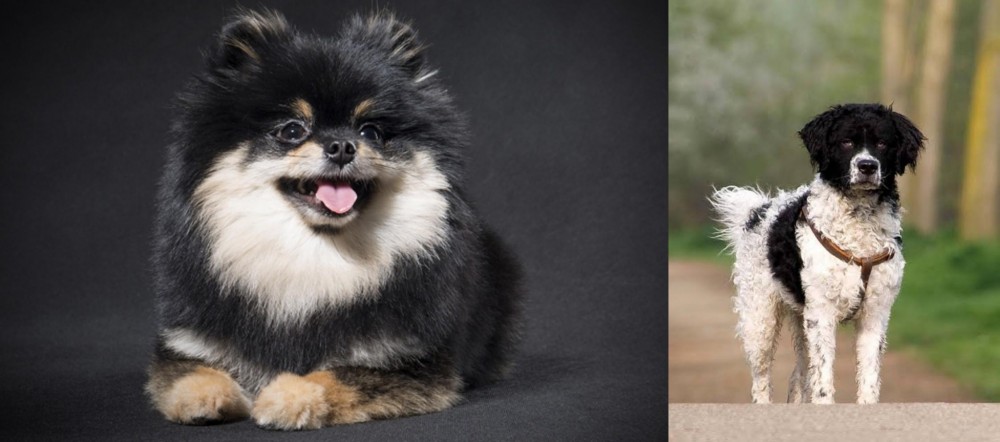 German Spitz (Klein) is originated from Germany but Wetterhoun is originated from Netherlands. German Spitz (Klein) may grow 31 cm / 12 inches shorter than Wetterhoun. German Spitz (Klein) may weigh 25 kg / 55 pounds lesser than Wetterhoun. Both German Spitz (Klein) and Wetterhoun has almost same life span. German Spitz (Klein) may have less litter size than Wetterhoun. Both German Spitz (Klein) and Wetterhoun requires Moderate Maintenance.
German Spitz (Klein) is originated from Germany but Wetterhoun is originated from Netherlands. German Spitz (Klein) may grow 31 cm / 12 inches shorter than Wetterhoun. German Spitz (Klein) may weigh 25 kg / 55 pounds lesser than Wetterhoun. Both German Spitz (Klein) and Wetterhoun has almost same life span. German Spitz (Klein) may have less litter size than Wetterhoun. Both German Spitz (Klein) and Wetterhoun requires Moderate Maintenance.
 Also referred to as the Miniature Spitz, the German Spitz is believed to have descended from the Nordic Samoyed and Lapphund. Some dog experts say they were developed from the larger European Spitz, and that they were once referred to as Pomeranians.
Also referred to as the Miniature Spitz, the German Spitz is believed to have descended from the Nordic Samoyed and Lapphund. Some dog experts say they were developed from the larger European Spitz, and that they were once referred to as Pomeranians.
It is also thought that these dogs were in all likelihood brought over to Germany during the Middle Ages. This gives you an idea as to how ancient the breed is. There are actually 4 different Spitz breeds, divided by their sizes.
The dogs were originally used as herding and guard dogs, but today you could say that this toy breed is essentially a companion dog.
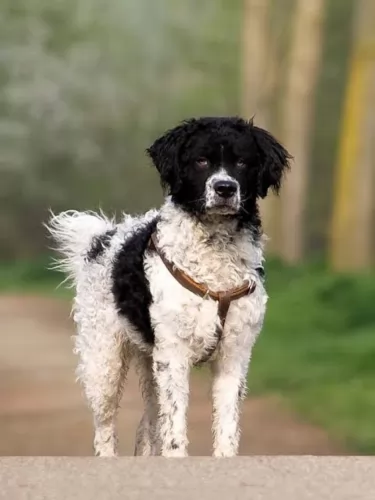 The Wetterhoun is a water dog developed in the 1500 or 1600s to hunt otters. The breed was developed by the Frisians in the Netherlands near the Northwest corner. In addition to catching otters in the lakes near by, they were also used as gundogs to hunt game. They are a fearless, tough and loyal working dog. They love the water and they are build for it with a waterproof coat and tight tail that is spiraled. They will swim happily in freezing cold weather as well.
The Wetterhoun is a water dog developed in the 1500 or 1600s to hunt otters. The breed was developed by the Frisians in the Netherlands near the Northwest corner. In addition to catching otters in the lakes near by, they were also used as gundogs to hunt game. They are a fearless, tough and loyal working dog. They love the water and they are build for it with a waterproof coat and tight tail that is spiraled. They will swim happily in freezing cold weather as well.
The Wetterhoun is rare and not seen outside of the Netherlands. Descendent of the Water Dog, that is now extinct, he is probably a relative of many spaniel types that also call the Water Dog their ancestor. Yet the Wetterhoun is not a spaniel or spaniel type.
The breed almost disappeared during World War II, like many others, they brought back and are now becoming more and more popular. The breed is only recognized by the Federation Cynologique Internationale and the United Kennel Club. AKC does not recognize them, but there are many hunting clubs and other registries that do. They are often promoted as one of the rare breeds.
 Classified as a toy breed, the German Spitz Klein looks like a small fox with his thick fur. He stands at between 23 – 28cm in height and he weighs 5 to 10kg.
Classified as a toy breed, the German Spitz Klein looks like a small fox with his thick fur. He stands at between 23 – 28cm in height and he weighs 5 to 10kg.
He has a sharp foxy face with small pointed upright ears and dark, bright eyes.
The double coat of the dog which can be fawn, cream, reddish, brown or black or a mixture of these colors, is straight, vibrant and off-standing to look at. He has a soft woolly undercoat. The tail of the dog curls up over the back.
The German Spitz Klein has got such a bright little face. He is a social, friendly dog, forming a strong bond with his human family. He is a smart dog too and can be easily trained.
Lively and independent, he is bold and adventurous. Even with a small dog like this, he will do well to be trained and socialized as he just becomes a better dog -obedient and relaxed around strange people and dogs.
Because of his size, he adapts well to life in the city or in the countryside. This is also because he doesn’t require a lot of exercise. The litter size for the German Spitz Klein is between 1 and 5 puppies.
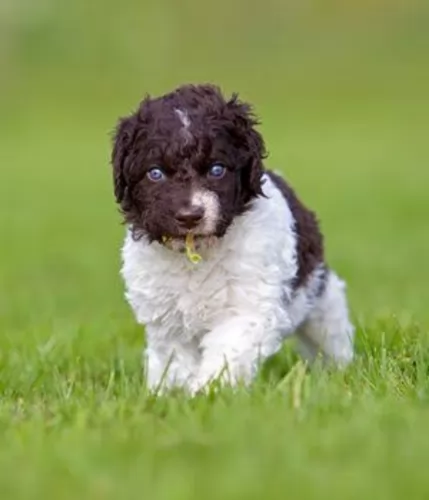 The Wetterhoun is a compact, medium sized breed weighing about 55 to 77 pounds. Great water dogs they are athletically built with low set ears hanging next to their heads, a waterproof coat, distinctive eyes with a very serious expression and a tightly curled tail held aloft over the back. Their coat is waterproof, somewhat oily, curly and thick. The fur is of a smoother texture on the ears, head, and legs. They can be solid black, solid brown, brown with white, or black with white.
The Wetterhoun is a compact, medium sized breed weighing about 55 to 77 pounds. Great water dogs they are athletically built with low set ears hanging next to their heads, a waterproof coat, distinctive eyes with a very serious expression and a tightly curled tail held aloft over the back. Their coat is waterproof, somewhat oily, curly and thick. The fur is of a smoother texture on the ears, head, and legs. They can be solid black, solid brown, brown with white, or black with white.
 This litle dog is seriously a case of ‘dynamite in a small package’. Bold, daring, brave, spunky, clever, playful and friendly, your confident little German Spitz Klein makes most families the perfect pet and companion.
This litle dog is seriously a case of ‘dynamite in a small package’. Bold, daring, brave, spunky, clever, playful and friendly, your confident little German Spitz Klein makes most families the perfect pet and companion.
Give him the love and attention he deserves, especially because he is undemanding and low maintenance, and with good care you’re going to have a most adoring companion for more than a decade.
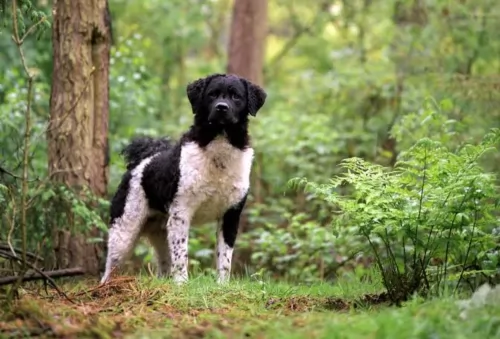 3.Adaptability – not a great apartment dog even though he is not that big. They need space. They need a job and they will finish their job at their own pace no matter what you say. It is impossible to train this trait out of them.
3.Adaptability – not a great apartment dog even though he is not that big. They need space. They need a job and they will finish their job at their own pace no matter what you say. It is impossible to train this trait out of them.
4.Learning ability Very high learning ability, very eager to learn and very smart. He is stubborn about finishing whatever job he is working on
 You’ve got a pretty healthy little dog breed but be that as it may, it doesn’t make him totally immune to some of the common dog diseases there are. With him, you might want to look out for eye disease and epilepsy.
You’ve got a pretty healthy little dog breed but be that as it may, it doesn’t make him totally immune to some of the common dog diseases there are. With him, you might want to look out for eye disease and epilepsy.
Glaucoma occurs when there is pressure in the eye. Your dog will have pain, red eyes, dilated pupils, increased tear production and corneal cloudiness. You want to have him at the vet for this because putting off treatment can lead to blindness.
This is a condition that can gradually lead to blindness even though the eyes look normal. Difficulty with seeing at night is one symptom. Fortunately the condition is painless and your dog finds ways to cope with the problem.
It is always a good idea when you suspect anything wrong with your pet, to get him to the vet as soon as possible.
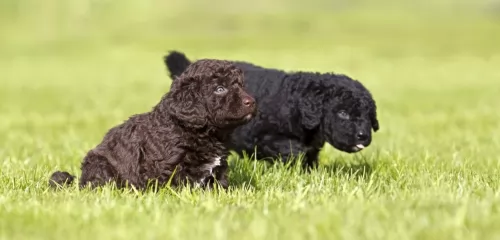 A hardy and healthy breed they do not have severe health issues. But like every his
A hardy and healthy breed they do not have severe health issues. But like every his
• Ear Infections – like any breed with hanging ears they can be prone to infection. This is particularly true because the dogs are in the water a lot. Be sure to clean and dry them after every water episode and inspect them on a regular basis even if the dog has not been in the water.
• Patellar Luxation – Knee cap issue with movement and inflammation. Can cause lameness and arthritis.
 As a feisty small-sized dog breed, your foxy little German Spitz Klein needs to get the very best food there is. If you are going to feed him a high-quality commercial dog food, make sure to read the ingredients on the packaging and buy him food according to his size and age. Mix in some home-made food from time to time and always ensure he has constant access to cool, fresh drinking water.
As a feisty small-sized dog breed, your foxy little German Spitz Klein needs to get the very best food there is. If you are going to feed him a high-quality commercial dog food, make sure to read the ingredients on the packaging and buy him food according to his size and age. Mix in some home-made food from time to time and always ensure he has constant access to cool, fresh drinking water.
He has a fairly long, thick coat, so a good brush twice a week will be adequate. While you’re brushing him, check him over for fleas and ticks too.
Always check his teeth and brush them a couple of times a week too. Bad teeth can cause a host of problems, not only with the teeth, but other parts of the body too.
He is an active, jaunty little dog that loves all kinds of games. Being a small breed, he isn’t going to be the kind of dog that you need to include in your jogging or cycling trips, but he is no couch potato, and he will love to go on a walk with you, and it also does him good to get out and about for a change of scenery.
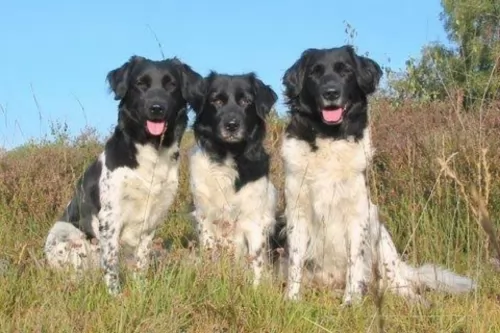 1Feeding the puppy -This is an active, hunting and swimming breed. They need good nutrition and high quality puppy food. A food formulated for active breeds or hunting dogs would be best. Feed your puppy in smaller amounts 3-4 times per day.
1Feeding the puppy -This is an active, hunting and swimming breed. They need good nutrition and high quality puppy food. A food formulated for active breeds or hunting dogs would be best. Feed your puppy in smaller amounts 3-4 times per day.
2.Feeding the adult - This is an active, hunting and swimming breed. They need good nutrition and high quality adult food. A food formulated for active breeds or hunting dogs would be best. Feed your adult twice per day.
4. Games and Exercises – This is an active working dog that needs a lot of exercise every day. A 30 minute walk is only the beginning. They need outdoor time to play and run. They need to swim if at all possible.